Nonviolence
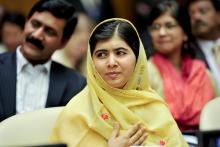
Malala Yousafzai has captured our love and imagination.
Malala was recently a guest on the Daily Show with Jon Stewart. By the end of the interview, Stewart was so enamored with Malala that he asked if he could adopt her. The remark was hilarious because it was true. After 5 minutes with this girl, who wouldn’t want to adopt her?
Malala is the 16-year-old Pakistani girl who fought for education in the face of persecution from the Taliban. She explained on the show that, “Education is the power for women and that’s why the terrorists are afraid of education. They do not want women to get education because then women would become more powerful.”
In the face of persecution from the Taliban, Malala says she “spoke on every media channel I could and I raised my voice on every platform that I could and I said, ‘I need to tell the world what is happening in Swat and I need to tell the world that Swat is suffering from terrorism and we need to fight against terrorism.’”
But it was what she said next that stole our hearts. She reflected upon what she would do if a member of the Taliban came to take her life.
If you hit a Talib … then there would be no difference between you and the Talib. You must not treat another with that much cruelty and that much harshly. You must fight others, but through peace and through dialogue and through education. Then I’ll tell him how important education is and that I even want education for your children as well. And I’ll tell him, ‘That’s what I want to tell you. Now do what you want.’

The U.S. has resisted this peacemaking policy for generations. Even as far back as 1792, a signer of the Declaration of Independence, Benjamin Rush, along with Benjamin Banneker, suggested the blueprint for an Office of Peace (intended to counter what was then known as the Department of War). President George Washington stated that his first wish was “to see this plague of mankind, war, banished from the earth,” yet legislation for a Department of Peace was not introduced until 1935, which, by 1969 wasfollowed by 90 additional bills. And so, while many U.S. citizens state a longing for peace and nonviolence, we seem to lack the political will and public motivation to make it a reality, and the result is a continued state of destruction.
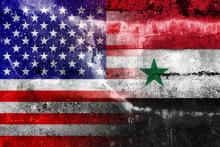
Two weeks ago, it seemed that any minute the United States would begin bombing Syria. On Aug. 27, NBC’s top headline ran: “Military Strikes on Syria ‘as Early as Thursday,’ U.S. officials say.”
So our Quaker lobby did what all of us peace and security groups do when our country’s decision makers decide to bomb another country and we have long odds and little hope of success from stopping them: we flooded our network — including many of the inboxes of readers of this blog — with pleas to join us in writing, calling, and lobbying members of Congress and the Obama administration to stop this new war.
The pressure worked to postpone U.S. war plans. The groundswell of grassroots opposition to this war persuaded President Obama to go to Congress before launching Tomahawk cruise missiles into Damascus. A vote was expected in days, and then it was delayed, as an unprecedented outpouring of public opposition from Americans of every political stripe pushed Congress to pursue alternatives to military force.
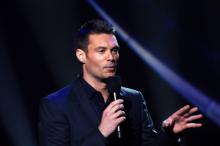
As President Barack Obama prepared to address the nation on Tuesday evening to articulate a plan for intervention in Syria, NBC rushed to assure its viewers that the Ryan Seacrest-hosted game show, The Million Second Quiz, would not be interrupted. As detailed by the network, the president would speak for only 15 minutes, thus viewers could watch their televisions with full confidence that the entirety of the hyped-up program would be fully protected. While there was suspense as to whether NBC would follow through on its promise of an unbroken telecast, the presidential coverage stayed within the agreed upon time slot, viewers were able to watch their regularly scheduled program, and all was well in the world.
In the meantime, all is not well in the world.
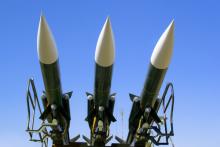
There’s a catch phrase that comes to the fore when people start looking for religious reasons not to enter a war like the one now raging in Syria: “Who would Jesus bomb?”
Jesus would not have bombed anyone, of course. Bombs were not weapons of choice in his day. But the cruelty of war was no stranger to his era. The Romans could be every bit as cruel as Syria’s Bashar al-Assad. They executed dissidents like Jesus himself with ease. They leveled the city of Jerusalem.
But if it is hard to imagine Jesus targeting a cruise missile aimed at another nation, it is not hard to imaging him encouraging his followers to stand with those who are most vulnerable, to seek ways to defend others from cruelty, to come to the aid of those refugees displaced by war. The question is how best to do that.

Right after 9/11, I asked a kid in my neighborhood what we should do in response. His answer: “Those people did something very wrong ...” He thought pensively and continued, “But two wrongs don’t make a right.”
As Martin Luther King taught us, you cannot fight fire with fire, you only get a bigger fire. You fight fire with water. You fight violence with nonviolence. You fight hatred with love.
As a Christian, a follower of Jesus the Prince of Peace, I am deeply troubled about the possibility of a military response to the violence in Syria. Jesus consistently teaches us another way to respond to evil, a third way – neither fight nor flight. He teaches that evil can be opposed without being mirrored, oppressors resisted without being emulated, enemies neutralized without being destroyed.
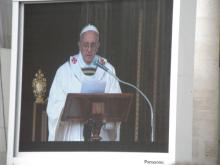
Pope Francis on Thursday told world leaders gathered in Russia for the G-20 summit that a military intervention in Syria would be “futile,” urging them to focus instead on dialogue and reconciliation to bring peace to the war-torn country.
The Argentine pontiff’s first major foray onto the global stage comes as the U.S. Congress prepares to vote on a military strike against Syria in response to a reported chemical weapons attack outside Damascus on Aug. 21.
For Francis, just six months on the job, the Syria question will test his ability to summon the power of his global bully pulpit and could play a major role in shaping the global image of a man who’s drawn more attention for his down-to-earth pastoral appeal.
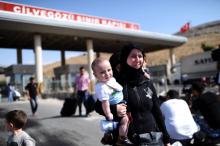
When a head of state is responsible for the deaths of 100,000 of his people and has used chemical weapons against innocent civilians — the world needs to respond. In one massive attack, the evidence appears to show that 1,429 people, including 400 children, suffered horrible deaths from chemical weapons banned by the international community. That is a profound moral crisis that requires an equivalent moral response. Doing nothing is not an option. But how should we respond, and what are moral principles for that response?
For Christians, I would suggest there are two principles that should guide our thinking. Other people of faith and moral sensibility might agree with this two-fold moral compass.

As the Obama administration considers a strike in response to recent chemical attacks, the head of a global evangelical group said Wednesday that Christians in the Middle East oppose military intervention in Syria.
“There is major consensus amongst the Christian leaders in this region that any military intervention would have a detrimental effect … on Christians in Syria,” wrote Geoff Tunnicliffe, secretary general/CEO of World Evangelical Alliance, in a letter to the State Department, the White House and the United Nation’s Security Council.
![Pope Gregory the Great, Carlo Saraceni [Public domain], via Wikimedia Commons Pope Gregory the Great, Carlo Saraceni [Public domain], via Wikimedia Commons](https://sojo.net/files/styles/medium/public/blog/Gregorythegreat.jpg)
As I began my morning devotions on Tuesday this week, Syria was on my mind. No surprise, right? The debate about whether to respond militarily to the use of chemical weapons is all over the news right now. Mostly folks are arguing about what actually happened and the larger geopolitical questions that a military strike involves, which are important and necessary issues. But here’s the question that was rattling around in my head as I turned to the day’s devotional readings on universalis.com: How does one respond to violence without becoming as guilty as the perpetrators you seek to punish?
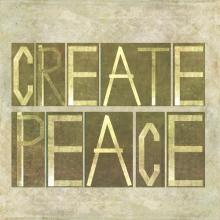
As the United States prepares to “officially” become involved in the Syrian war, Christian pacifism has reemerged as a much-discussed and relevant topic. Unfortunately, the concept has been somewhat misrepresented, undervalued, and often downright demonized within evangelical communities.
Critics often assume Christian Pacifism is some sort of radical political movement associated with marijuana-smoking hippies who are anti-government conspiracy theorists. To make matters worse, pop-culture (and much of Christian culture) has made pacifism seem, well, passive — as if pacifists are unpatriotic and un-American heretics who refuse to enlist in the military and avoid physical confrontations at all costs. They are characterized and perceived as weak, scared, and gutless.
In reality, the beliefs that form Christian pacifism are spiritual and scripturally founded around the life of Christ. And whether you agree with the theology, it’s hard to passively dismiss the Biblical argument for pacifism as some sort of crazy mumbo-jumbo.
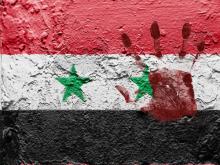
As the Obama administration readies for a probable military strike against Syria, Religion News Service asked a panel of theologians and policy experts whether the U.S. should intervene in Syria in light of the regime’s use of chemical weapons against civilians. Would the “Just War” doctrine justify U.S. military action, and what is America’s moral responsibility? Here are their responses, which have been edited for clarity.
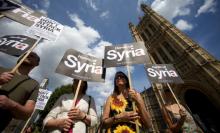
On Wednesday, President Barack Obama said that if Bashar al-Assad used chemical weapons against innocent civilians, there must be “international consequences.” The president is right. But what should those consequences be?
The issue here, again, is one that we have not decided how to deal with: terrorism. The definition of terrorism is deliberate and brutal attacks upon innocent people — whether by individuals, groups, or heads of state. By that definition, Assad is a terrorist. And terrorists who possess weapons of mass destruction and demonstrate their willingness to use them are most dangerous ones. But how should we respond?
I am in in the U.K., where political leaders last night backed off the decision to make immediate “military strikes” while the U.S. and other nations are considering them. The feeling here is that international and legal legitimacy need to be established first, that the U.N. inspectors should finish their examinations in Syria before any actions are taken, and that all other means of response should be fully explored first. These are good decisions.
Why is there such public “war fatigue” in the U.K. and the U.S. in light of Iraq and Afghanistan — and why is that creating reluctance to more military action? Because wars and military solutions have FAILED in response to terrorism — failed to achieve what they were purported to do.
![President Lyndon Johnson and Martin Luther King, Jr. By Yoichi R. Okamoto [Public domain], via Wikimedia Commons By Yoichi R. Okamoto [Public domain], via Wikimedia Commons](https://sojo.net/files/styles/medium/public/blog/512px-Lyndon_Johnson_and_Martin_Luther_King%2C_Jr._-_Voting_Rights_Act.jpg)
We’ve spent the last few days recalling the anniversary of the March on Washington and listening again to the Rev. Martin Luther King, Jr., talk so powerfully about his dream of a land that is full of love and free of hatred. Stirring words. Inspiring words. Spirit-infused words. We’re also reminded that they’re only words until they produce action.
It’s one thing to be inspired when we hear something, another thing to respond to the inspiration and to do something.
Powerful words play a big role in our lives, challenging us and leading us. God is love. Love one another. Be compassionate. Love your enemies. Whatsoever you do to the least. Your brother‘s keeper. An instrument of your peace. Give to all. The moral arc of the universe is long, but it bends toward justice. Blessed are the poor. All men are created equal. The common good. Government of, by and for the people. I have a dream. Be the change. Make justice a reality for all God‘s children.
Those and so many other words inspire us to raise our lives and our world to new heights. But they remain words until we commit ourselves to live them. Then they acquire real power.

“Blessed are the peacemakers, for they will be called the sons [and daughters] of God.” Matthew 5:9
The news cycle, the blogosphere, and social justice advocates often focus upon crisis, tragedy, and pain. Moments of freedom, of healing and hope are often drowned out by the cacophonous sounds of self-interest, fear and danger. Today I’d like to silence that cacophony and trumpet loudly about the brave and humble Antoinette Tuff, a peacemaker filled with the Spirit of God, who faced a gunman with her arsenal of love and compassion and saved a school full of children.
Antoinette Tuff’s faith and courage changed the outcome of history on Tuesday, Aug. 20. It is a day that will not live in infamy. Unlike other days that started on a similar path to violence, families did not grieve the loss of their children to the would-be mass gunman who walked into an elementary school with almost 500 rounds of ammunition. Police were scrambled to the scene, but did not have to evacuate classrooms of frightened children watching for a shooter. In fact, despite the heavily armed suspect and a heavily armed law enforcement response, not one person lost their life.

Upon my recent return from the Middle East (with The Global Immersion Project), I was struck more than ever before at our Western infatuation around military aggression, violence, and division. Not only are these the primary narratives we are fed through our major media outlets, they are the narratives we subconsciously embrace through the latest bestseller, box office hit, or video game. Violence, death, and division have become normative. We are becoming numb to the very things that we – as ambassadors of hope and reconciliation – are to turn from as Resurrection People. It is as though there is a stranglehold on our on our ability to see and participate in the stories of healing and new life.
As surprising as this may be, embedded in the midst of these conflicts are endless stories of hope that never make the latest headline or sound bite. And in the times I've followed Jesus INTO these places of conflict, I continue to encounter stories of peace and hope that embody the Gospel message, stories by real people, happening right now, in places usually known only for conflict, violence, and death.
...The army is used as "an institution that promotes social cohesion" and a "principal place" of forming national consciousness and participating in the nation building project "as conceived by the authorities, i.e. promoting Israel as a Jewish national state". In this perspective, according to the Justice and Peace commisssion operating in the Holy Land, "talk about drafting of Christian Arabs rather than the Arabs in general - Muslims and Christians - is clearly an attempt to drive a wedge between Christians and Muslims in Israel". On addressing these delicate problems, the Church should keep in mind that "the army is used as a means of imposing and maintaining the occupation of Palestinian territories and thus preventing Palestinians from achieving dignity and independence". The army is primarily "an army of aggression rather than an army of defense". Therefore "the use of army service to divide the Arab population against itself is detrimental to the interests of the Arabs as a community."
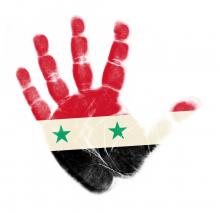
PRESSURE IS BUILDING for the United States to become militarily involved in the Syrian civil war. The result would be further bloodshed and destruction for the people of Syria, the worsening of an already grave regional security crisis, and U.S. involvement in another Middle East war.
The Obama administration has apparently decided to provide arms to the rebels. Sen. John McCain and others in Congress are calling for a no-fly zone and air strikes against Syrian government targets. The increased hard line comes in response to allegations that Syrian government forces have used chemical weapons, crossing the “red line” President Obama warned against—although reports have surfaced that rebel forces also may have used chemical weapons.
Concerns about the use of chemical weapons are serious, but they are not a justification for military action that could drag U.S. forces into the deadly civil conflict. Bombing strikes would not be sufficient to neutralize Syria’s vast arsenal of chemical weapons, and they could cause chemical explosions that would release the deadly toxins we seek to contain.
For a military operation to achieve results, it would have to be a large-scale undertaking. Creating a humanitarian safe zone or attempting to impose a no-fly zone would require a major commitment of allied forces and would lead to serious military confrontation with hostile Syrian forces.

Last year, 506 murders happened in the city of Chicago — the majority of them in black communities. Similar rates of violence swept through places like Philadelphia, Camden, N.J., New Orleans, and the list could go on and on. I have in my life begun to declare myself a pacifist. I have made this change because I think, as a black man, the only recourse for me is to try and stop violence that happens in so many black communities. Turning the other cheek, responding with a gentle answer, forgiving a misunderstanding: these are the paths to recovery in my neighborhood.
The “if someone hits you, hit them back” mentality is destroying black men at an alarming rate. Dads, teach your boys to talk it over, look the other way, or keep walking when things begin to escalate.